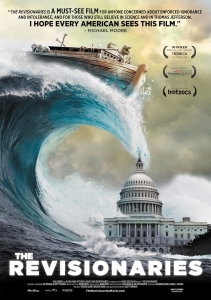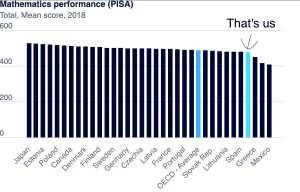“A Farce, or a Tragedy, or Perhaps Both.”
Why Trump Won
The making of the electorate Trump just won, and thusly the United States we have now, started decades ago in school. The Conservative Takeover of America was not secret, it was worse than secret; it was boring and bureaucratic. The conservatives worked slowly, patiently, and persistently to not merely change our institutions, but to hobble the next generation, and the next after that. This effort maybe started in Texas, but it had metastasized all over the country years before the first early ballot was cast in 2024. It was massive, and coordinated, but not by any overt conspiracy. Instead it was a persistent and ideological effort to destroy schools in America.
Education was always key to the American Experiment. Back when the founders were trying to figure out how to make this democracy thing work Jefferson said: “I know no safe depository of the ultimate powers of the society, but the people themselves: and if we think them not enlightened enough to exercise their control with a wholesome discretion, the remedy is, not to take it from them, but to inform their discretion by education. This is the true corrective of abuses of constitutional power.” But over the later 20th century and the beginning of this one, our commitment to an educated electorate faltered. We stopped seeing it as a process to create citizens, and started seeing it only in terms of creating workers.
There’s a documentary movie that I’ve been recommending to people since the election. Made by PBS in 2012, The Revisionaries tells a story of some of the people who laid the groundwork for shift to ignorance: the Texas Board of Education.
You can see if here, and it’s well worth your time. In this story a Young Earth Christian dentist named Don McLeroy fights science education. He battles textbook publishers, sometimes sentence by sentence, to shape the education of Texas children, and by extension much of America. (Texas is a big enough market to drive enough sales that places like Delaware or Montana don’t get as much influence.) In this story he is dogged and effective, and it’s both painful and impressive to watch him fight. He’s not alone — the Christian Right has been fighting for years to reshape science, history, and all aspects of education for all American children, and they’ve largely succeeded. Along the way, they have wrecked so many American minds.
The story of the Revisionaries fits into a broader story of how destroying education has destroyed an electorate, and possibly now, a nation. These last decades have seen concerted attacks on education. Nowhere was this more obvious than the state of Texas, as The Revisionaries documented. But it also took the form of chronic under-investment in education all over the nation. Under-investment that went on for decades, as well as charter and private school scams perpetrated by the Right Wing against American children. School vouchers promised to let kids attend better schools than the public schools America was once so rightfully proud of, further degrading the resources for public education. A lack of supervision at private and charter schools that accepted vouchers has meant that they often lag even behind their underfunded public rivals. The American Right knew that if you capture the children, you capture the future, and they worked on that.
It was also our bad luck that this under-investment in education coincided with one of the greatest media revolutions in history, if not the greatest: the invention and popularization of the Internet. Social media, online publishing, endless information are amazing; they are superpowers. Our smartphones are like the wands in the Harry Potter universe, opening up endless possibilities, and the chance to see the world as a whole in a way we never have before. Ideas and media can romp around the world in the time it takes to make a cup of coffee. But there’s no Hogwarts for the internet: we just gave everyone superpowers and hoped for the best.
It has been a disaster on many levels, but most painfully it has been a human rights disaster. The first genocide organized on Facebook killed Rohingya in Myanmar in 2016, while hundreds of thousands fled to Bangladesh. Russian political interference all over the world capitalized on the internet and its terrible security. Various crashes of cryptocurrency bankrupted people too confused to know what they’d bought, all just to name a few notable internet driven catastrophes. To talk about them all would take books, but you can probably think of your own; anything from Enron to Pets.com to Bored Apes.
The statistics of our electorate are discouraging. After these decades of under-investment in schools, communities, and ESL resources, more than half of adults can’t read at a level required for a healthy democracy. A Gallup study of Department of Education data found that 54% of U.S. adults, aged 16 to 74 years old, have 6th grade or lower reading comprehension. That’s 130 million people who cannot read at a high school level. They are not up to the technical challenge of reading George Orwell’s Nineteen Eighty-Four, Kurt Vonnegut’s Slaughterhouse-Five, or Octavia Butler’s Parable of the Sower. But they are now on the internet hours a day, interacting with algorithmic content that increasingly creates the whole context of their lives without many of these citizens ever knowing how any of it works, or works on them.
Math Might Be Even Worse
Math literacy and education are in even worse condition. Understanding the issues we face living in an informational internet landscape requires numeracy — especially in statistics. Our news stories, and even this very article requires some understanding of probability, ratios, and change over time. We need to know whether a number being reported is small, large or even meaningful. We live on the internet now, and the internet is mathematical in nature. Media reports in statistics every day, whether it’s studies, or the effects of policies, or even the weather, which is becoming increasingly dangerous. We need to be able to interpret statistics and other numbers on the fly to even understand headlines, like 54% of people can’t read Orwell’s Nineteen Eighty-Four.
 In this election the case that broke me wasn’t Trump. It was Proposition 6 in California. In the alleged greatest left-leaning bastion of the nation, people were voting on convict slavery. And they voted, by a clear majority, for slavery. One of the reasons given for this dumbfounding and reprehensible loss was that the language of the proposition was too complicated. The proposition was about Involuntary Servitude, which the campaigners realized too late many people would not understand was a fancy term for slavery. In Nevada, where the term slavery was used, a similar measure passed. It could be that Californians are just far more right wing and pro-slavery than we ever realized, but there’s another explanation.
In this election the case that broke me wasn’t Trump. It was Proposition 6 in California. In the alleged greatest left-leaning bastion of the nation, people were voting on convict slavery. And they voted, by a clear majority, for slavery. One of the reasons given for this dumbfounding and reprehensible loss was that the language of the proposition was too complicated. The proposition was about Involuntary Servitude, which the campaigners realized too late many people would not understand was a fancy term for slavery. In Nevada, where the term slavery was used, a similar measure passed. It could be that Californians are just far more right wing and pro-slavery than we ever realized, but there’s another explanation.
California voters didn’t know what the phrase “Involuntary Servitude” meant and couldn’t work it out while filling out a ballot.
The Only Way is Through
We knew that our system required universal literacy and education for voters from the beginning of the American experiment. James Madison said “A popular government without popular information or the means of acquiring it, is but a prologue to a farce, or a tragedy, or perhaps both.” The founders focused on creating an education system for their voters. As the definition of voter widened, so did the need for universal public education. There was a time when our particular universal public education system was the envy of the world, despite its flaws. Particularly in the first half of the 20th century, the post war period, and the Civil Rights era, we focused on universal literacy and basic math and science education. We brought more people than ever into a culture of knowledge, and standards rose. It was never good enough, but for a time, we lead the world’s march towards universal literacy.
But by the end of the 20th century, that system was failing. Several studies and reports such as the 1983 ‘A Nation at Risk‘ showed that literacy wasn’t keeping up with the population. Math skills were increasing, but there were always questions about the curriculum, and whether it was fit for purpose. It might be that Americans are bad at math because American schools are bad at teaching math, but there’s also no real movement for reform.
This election is a disaster that will take many years to unwind. But the key is education. Without fixing education, we can’t fix our country. But we have also been trained by our media to demand quick fixes, and there might not be any quick fixes available here. Rebuilding an educational system is the work of many, done over decades. But it’s also the only way to have, or possibly one day regain, a democracy.





